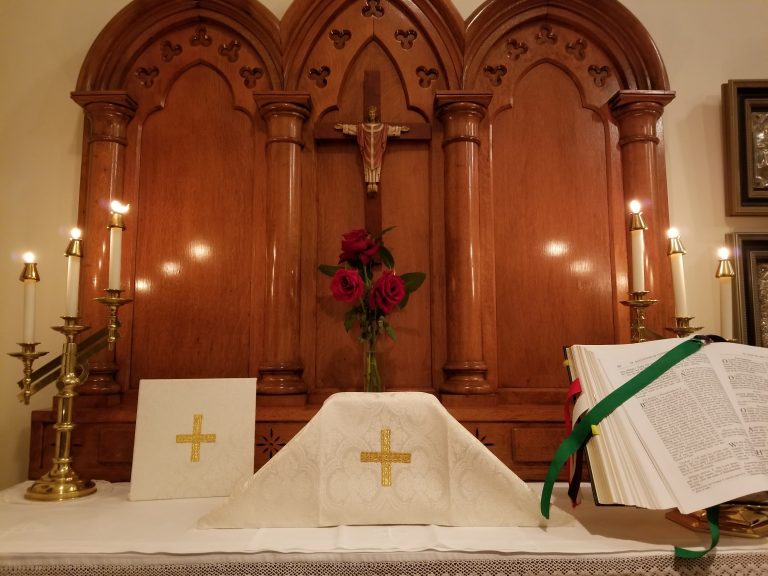The Unshakable Source of Hope in a Hopeless World
Sermon Preached on December 10 by Fr Allen at St Michael the Archangel Anglican Church, Matthews, North Carolina for the Second Sunday in Advent.
“That we through comfort of the Scriptures might have hope.” In the Name of the Father, and of the Son, and of the Holy Ghost. Amen.
Last week we discussed how Advent is preparing us to receive all that Jesus offers in His coming: His being 1, the perfect human fulfilling man’s vocation as Prophet, Priest, and King; 2, the fulfillment of God’s Scriptural-promises guaranteeing our hope; 3, the high priest and chief Bishop of God’s people preserving the mission of His Body on earth; and 4, the Mediator coming in power to institute the New Covenant between God and Man. Today we turn to look at the 2nd of these: the hope guaranteeing Scriptures, which Jesus both died and rose again in accordance with, and also caused to be written for our learning.
Now, how many here have gotten the perfect gift (either given or received), only to realize months later, it never got used? Either because of reliance on similar items or simply being too busy, the gift that would have made life better never got added to our daily grind. The gift of the Scriptures is a lot like that: it’s the perfect gift given to us by God Almighty but we never get around to using it. Now we will listen to other people’s stories about it. We will even participate in weekend services inspired by it. But despite it all, the Scriptures never quite become our personal source of faith and hope.
At best we mistakenly read the Bible like it’s a list of instructions only to be consulted when things could not be solved on our own, instead of a list of all the promises God has kept, and those still to be fulfilled. We rarely get around to seeing the resumé of the God Who is saving us and equipping us to carry out His will on earth as it is carried out in heaven. Yet, it is this aspect of the Scriptures that allows them to be the source of hope.
Now, the Biblical hope, which the “comfort of the scriptures” gives has nothing to do with our modern notions of hope. In modern times hope is little more than “a feeling that what is wanted will happen” or a “finger-crossing wish.” If this is all we think hope is then, of course, we would not start using something that promises more pie-in-the-sky wishful thinking.
But hope, Biblically speaking, is a trustful expectation and confidence that what God has done for us in the past guarantees our participation in what God will do in the future. The Scriptures, as Jesus caused them to be written, are our source of hope because they show us the God who keeps His promises.
From the Old Testament to the New, God alone is shown to be the ultimate ground and object of hope. When He redeemed the Israelites from bondage in Egypt, He did so to fulfill the promise He made to Abraham (Gen.12:1-3). He provided for their needs in the wilderness, formed them into a covenant community at Sinai, and led them into the successful occupation of Canaan, showing that they could put their hope in Him and His promises. These faithful acts, written for our learning, have always been understood by God’s people to be the basis for their confidence in God’s continuing purposes for them. Even when Israel was unfaithful, hope was not lost. Because of God’s faithfulness and mercy, those who returned to Him could count on His help (Mal.3:6-7) and forgiveness (2Chr.7:14; Ps.86:5).
Typically, Israel’s unfaithfulness could always be traced back to when they began putting their faith and hope in things other than God for their value, purpose, or security – things which were a part of the created order and were thus weak, transient, and apt to fail. Time and time again, things like wealth (Pss.49:6-12; 52:7; Prov.11:28), houses (Isa.32:17-18), political leaders (Ps.146:3), military might (Isa.31:1-3; 2Kng.18:19-24), and even the Jerusalem temple (Jer.7:1-7) would come to dominate God’s people’s faith and hope (and these too have been written for us to learn from their mistakes).
But God’s promises did not stop with Abraham, but only started there. Yes, He promised to deliver Abraham’s descendants from their bondage (Gen.15:13-14), but He also made the greater promise of bringing all the nations out from under the curse into the Lord’s blessing through one of his descendants. This was how God’s people always knew that God was not through with them but had greater things instore – this was Messianic hope: the guarantee that God would raise up an anointed ruler from David’s line (2Sam.7:14) to restore blessing, not only to Israel but to every nation.
His faithfulness to that promise is what we are about to celebrate at Christmas – when in Jesus, He gives us the gift of His fulfilled Scriptural-promises – showing once and for all that He alone is trustworthy enough for us to place all our faith and hope in Him, and such hope will “never put us to shame” (Rom.5:5). For “the hour cometh and now is when the true worshipper…






